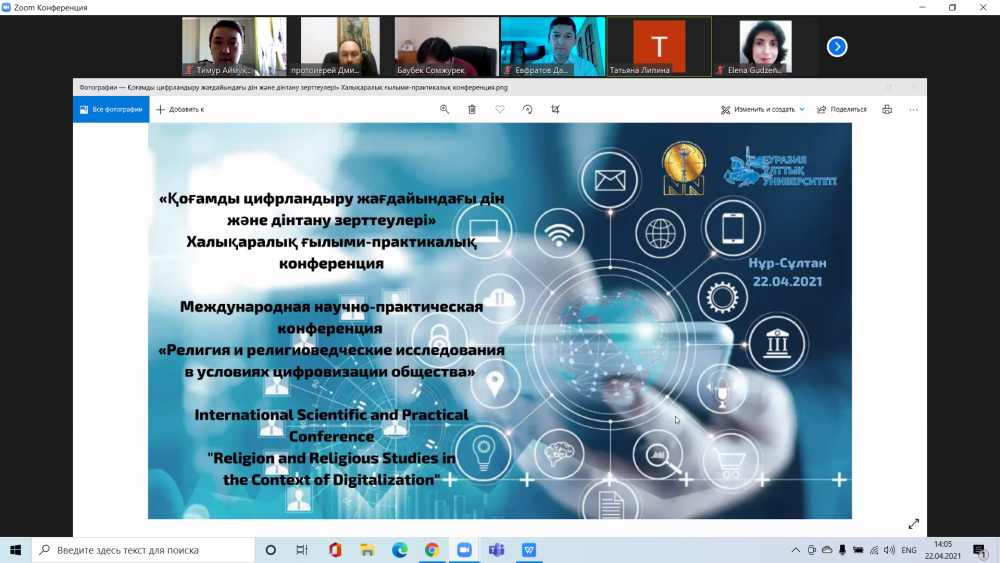On April 22, 2021, the Department of Religious Studies at L.N. Gumilyov ENU jointly with N. Nazarbayev Center for the Development of Interfaith and Intercivilizational Dialogue, held an international scientific and practical conference “Religion and Religious Studies in the Context of Digitalization of Society”. The conference was held via “ZOOM” with the participation of Kazakhstani and foreign researchers from Ukraine, Russia and Uzbekistan. The special guests of the conference were representatives of religious associations of Kazakhstan. Also experts from Kazakhstani research organizations showed their interest in the conference.
The Dean of the Faculty of Social Sciences Baubek Somzhurek and Deputy Chairman of the Committee on Religious Affairs of the Ministry of Information and Social Development of the Republic of Kazakhstan Anuar Khatiev delivered welcoming remarks. Ruziya Kamarova, Director of the Department of Religious Studies of the Institute for Analysis of the Religious Situation and Religious Expertise, in her welcoming speech on behalf of the N. Nazarbayev Center for the Development of Interfaith and Intercivilizational Dialogue, shared her exploratory works on the religious situation and education, which actualized the agenda of the conference.
The pandemic and the development of digitalization processes have affected all areas of society. In this context, the thesis of the authenticity of religious rituals and their performance in the virtual space acquires a special meaning. Smayil Seytbekov, head of the Department of Religious Education and Personnel Training of the Spiritual Administration of Muslims of Kazakhstan, devoted his report to the transformation of the forms of religious service, but not the immutability of their essence. Dmitry Baydek, archpriest, senior priest of the Uspensky Cathedral, in the report on the experience of the Orthodox Church in using Instagram, shared the fact that in such a difficult period as quarantine, social media tools that allow conducting religious rituals and sermons online can serve as a kind of consolation for believers. The support of the participants was received by the report of the pastor of the Evangelical Lutheran Church in Kazakhstan Zhanibek Batenov on the painful issues and problems associated with digitalization. He also spoke about the experience of using digital technologies in the activities of the Сhurch.
One of the co-authors of the report Olga Dobrodum, professor from the National Pedagogical Dragomanov University (Ukraine). Olena Gudzenko, another Ukrainian researcher from the Lesya Ukrainka Volyn National University, actualized the issues of researching self-knowledge in Ukrainian philosophy in the digital community.
Yulia Shapoval, the professor of the Department of Religious Studies at ENU, in collaboration with Madina Bekmaganbetova, the doctoral student of the same Department, presented unique research results on the topic of the “Digital Caliphate” in the narratives of female repatriates from ISIS. The thesis about the "creation of a radical online environment" was expressed, serve as a breeding ground for the process of religious radicalization.
In the sectional session moderated by Tatyana Lipina, the doctoral student of ENU, a number of topical reports were also presented. Considerable interest was aroused by the speech of Viktor Kuzmin (Russia), the student of Religious studies at, who revealed the peculiarities of using the Internet in the activities of Tatyana Mikushina and her followers, who created a whole “network community” of believers on the SIRIUS website. Abdulla Mirzakhodzhaev, the doctoral student of the International Islamic Academy of Uzbekistan in his informative speech revealed the theoretical and practical aspects of the usage of media and information technologies in the field of religions.
Olga Gold, the researcher at Odessa National University (Ukraine) presented the case of the USA during the pandemic and its related transformations of religious and mediation practices. In its own turn, Vladislav Bezmenov, the master's degree student in Comparative religious studies at Lomonosov Moscow State University demonstrated the European experience of desecularization, in which media were of no small importance.
In addition, the participants were able to listen to the speeches of doctoral students in Religious studies of ENU. So, Rakhimzhan Rashimbetov actualized the issues of motivational elements in the religious content of social networks. Temirbayeva Aigerim shared the results of a study of the activities of Sufi tariqas in the media space, once more raising such a significant issue of religious online rituals.
The moderator of the conference, head of the department Murat Smagulov, summed up the discussion, announcing a collection of materials, which would be published as a result of the conference.
This conference of the Department of Religious Studies of ENU became the “first sign” in understanding the processes of digitalization and mediatization of religion, which in the future should become an integral part of the Kazakhstani academic discourse.


